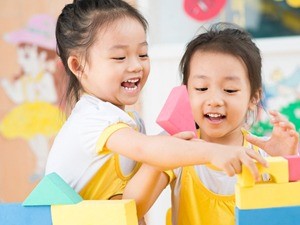- 855.224.8655
- Schedule a Tour

There’s a reason that building blocks are some of the most common toys you’ll find in preschool classrooms. Playing with blocks provides a wide-ranging, versatile learning experience for young children.
The benefits of block play in preschool have even been scientifically documented. A study published in the Journal of Research in Early Childhood Education showed that children who played with blocks when they were between three and five years old went on to perform better in math classes in grade school.
What exactly do young children learn during block play? Here are five benefits of block play for preschoolers.
1. Spatial concepts
Preschoolers learn about spatial awareness when they move and arrange blocks. When children build structures and talk about them, they get a chance to use spatial vocabulary like “under”, “over”, “between”, “on top of” and “inside”. Their experiences with block play provide context to the spatial words. You can help them practice spatial vocabulary with questions like, “Where did you put the blue block?”
Spatial skills provide a great foundation for STEAM (Science, Technology, Engineering, Art, and Math) concepts.
2. Math concepts
As previously mentioned, studies show that block play correlates with math achievement in grade school. Even in preschool, children learn math concepts through block play, such as sorting, counting, and symmetry.
You can encourage children to try counting how many blocks are in their structure. They may also observe that one structure is higher because it has more blocks. At this age, many children are learning concepts of more or less, and block play is a great activity to reinforce such concepts.
3. Motor skills and hand-eye coordination
Building tall block towers takes patience, concentration, and a good deal of accuracy in motor skills and coordination. Preschoolers learn how to determine exactly where they should place a block to keep a tower balanced, and then use their hands to carry out that decision.
4. Teamwork
Block play is a great way to support preschoolers’ social-emotional development, as this is the age when they are really learning how to play with others. Having children work together to build a giant block city or zoo (or whatever they ideate) is a great way to help them learn cooperation and teamwork. Everyone has to work together to make the structure is sturdy and coherent, and children quickly learn to communicate their thoughts and ideas to their peers.
5. Imagination
Blocks are not inherently representative of building-like structures, even though they’re often used to construct models of them. This means children can imagine them to be whatever they want, encouraging creative play.
Block play supports children’s social-emotional development and also teaches critical skills in problem-solving, math, engineering, creative thinking, and more. Blocks provide great learning experiences in our classrooms, but they are also an activity you can easily do at home. Just make sure your children have plenty of space to build and be active!
For information about U-GRO Learning Centres and how we incorporate activities like block play in our preschool curriculum, contact us or schedule a visit today.
